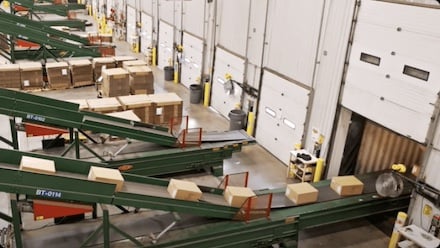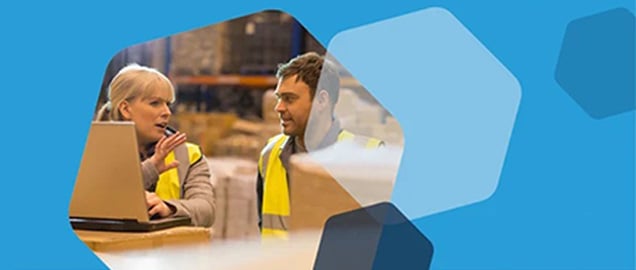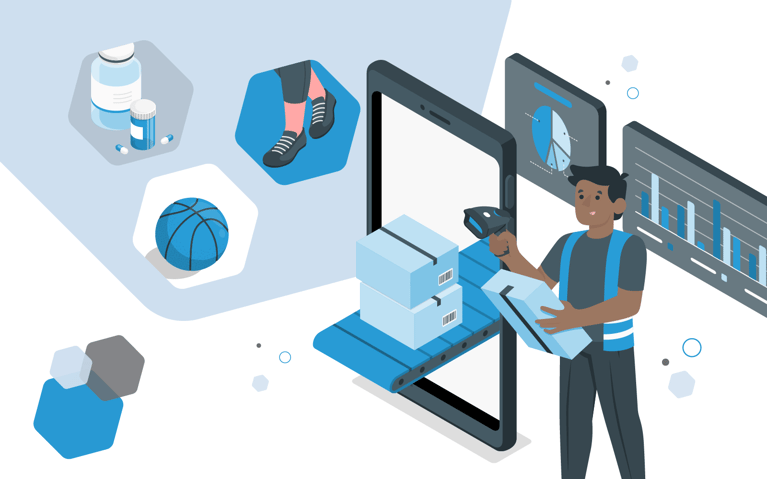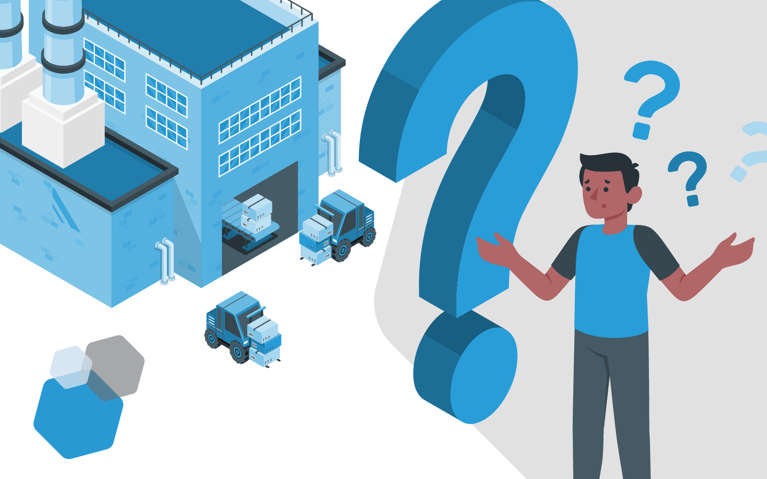Originally posted June 8, 2023, updated April 25, 2024 by A. Wolfe.
In logistics and supply chain management, businesses have many choices for which components of the supply chain to outsource. Some opt for contract logistics while others use third-party logistics (3PL) services. Today, given the growth of ecommerce and disruptions to global supply chains, the line between 3PLs and contract logistics providers has blurred, and the terms are often used interchangeably. However, to make informed decisions for outsourcing your fulfillment operations, it's important to understand the similarities and the differences between contract logistics and 3PLs, and how to select which services are right for you.
What’s the difference between contract logistics and third-party logistics?
Contract logistics refers to providers that manage a variety of logistical resources on behalf of a client. In the past, many such providers have primarily focused on freight, transportation and the movement of goods. Today, however, most contract logistics providers can support needs across a customer’s entire supply chain, providing various services, including network and supply chain planning, freight forwarding, transportation, inventory management, warehousing, order fulfillment and an array of adjacent value-added services. Today’s contract logistics providers can assume end-to-end responsibility for these operations, coordinating third parties as necessary and tailoring their services to meet the specific needs and requirements of their clients.
On the other hand, 3PLs have historically been more associated with providing warehousing, inventory management, order fulfillment services and reverse logistics through assets they operate. That said, many 3PLs today also offer additional logistics capabilities similar to those of contract logistics providers, including freight forwarding, transportation management and customer service. 3PLs typically run their own facilities, whereas a 4PL (fourth-party logistics) provider may manage a network of 3PLs. You may also encounter the terms asset-based and non-asset-based or asset-light logistics, which indicates whether or not the provider operates their own physical assets such as warehouses or trucks.
Companies may also find dedicated fulfillment providers that focus exclusively on order fulfillment. Many of these providers also focus on a single channel, e.g. direct-to-consumer parcel orders, while top providers will focus on delivering omnichannel support for companies selling on their website, marketplaces like Amazon and through owned and third-party brick-and-mortar stores.
While the lines between these categories have blurred as providers attempt to offer ever-greater value to their customers, there are some general considerations that are important to keep in mind as you choose your ideal partner. We’ve outlined a few below.
Why choose contract logistics services?
When navigating the complexities of modern supply chains, choosing contract logistics services can be a strategic game-changer. These specialized providers offer tailored solutions, optimizing efficiency and flexibility while minimizing risks. With contract logistics you’ll get:
- Integration and coordination: Contract logistics provides a holistic and integrated approach to managing the entire supply chain, from the factory floor to the customer’s door. By entrusting the management of your logistics to a single provider, businesses can streamline their operations, enhance coordination and achieve greater efficiency.
- End-to-end expertise: This is all contract logistics providers do. They specialize in managing complex logistics operations and have the expertise required to handle warehousing, transportation and other critical aspects of the supply chain. Some contract logistics companies will even work with you to design your supply chain and distribution network, in addition to managing its operation.
- Extensibility: Contract logistics providers typically enable you to add services as needed. They will coordinate and manage these services, so you don't have to worry about building out new capabilities or finding new providers as you grow.
- Cost savings: Contract logistics services can lead to cost savings in various ways. Businesses can avoid the capital expenses associated with establishing their own logistics infrastructure, such as warehouses and transportation fleets. Additionally, outsourcing logistics allows companies to focus on their core competencies, potentially leading to improved productivity and reduced operational costs.
Why choose 3PL services?
- Asset advantage: 3PL providers often excel in specific areas of logistics, particularly in the middle of the value chain between port of discharge and the last mile. They operate their own assets, meaning they can make improvements in real-time and can work with you to optimize activities to improve outcomes. Unlike 4PLs that don't have direct control over operational assets, 3PLs enable you to work directly with the team with their hands on your inventory.
- Technology and data: Because they operate their own assets, 3PLs will have technology, including robust Order Management Systems (OMS) and inventory management solutions that allows them to oversee operations, making it easier for you to monitor and manage orders and inventory in real-time. They may also have their own behind-the-scenes technology such as a Warehouse Management System (WMS), that enables them to continuously optimize on your behalf.
- Modularity: 3PLs often offer their services a la carte, giving businesses the flexibility to choose specific offerings as needed. Like contract logistics providers, many 3PLs today also offer and manage a litany of additional services through partners, such as transportation management and freight related services that can further extend their capabilities. Many provide value added services as well.
- Economies of scale: 3PL providers typically serve many clients, giving them at-scale freight partnerships, rates and resources that can enhance supply chain efficiency and reduce costs for you and your customers. They have access to a wide range of transportation options, warehousing facilities in strategic locations (a multi-node network) and advanced technology systems such as order and inventory management systems. Leveraging these resources can result in improved speed, reliability and overall performance of the supply chain.
Choosing the right provider
When selecting a logistics provider, whether it’s a contract logistics provider, a 3PL, pure-play fulfillment provider or a unique solution like a dedicated fulfillment site takeover, businesses should consider the following factors, even if you don’t need them all in the near term:
- Expertise and experience: Look for a provider with a proven track record of handling the level of complexity. Assess their experience in managing similar operations, their industry knowledge and their ability to handle complex supply chain challenges.
- Infrastructure: Evaluate the provider's warehousing facilities, transportation network, and technology capabilities. A robust, highly integrated infrastructure and advanced systems will ensure efficient operations that allow you to match or exceed competitor’s capabilities. Although your customers don’t see the facilities or technologies behind their order, they can and do feel the frustration with suboptimal infrastructure.
- In-house secure technology: Many providers outsource their technology, making it harder to continuously improve as needs arise. Seek a provider who built their Distributed Order Management and Warehouse Management System in-house. Ensure industry leading security to protect your data and customer data. Ask about speed of cloud-based deployment and API integrations with other systems to see how quick they can get you live.
- Visibility and control: Look for real-time visibility and control over inventory and orders. Real-time inventory tracking and monitoring ensure you always know exactly how much product is available. Demo to ensure you can track every order from start to finish (including returns) and easily search for orders by email, SKU or order number. AI-based predictive analytics and automation capabilities are a plus.
- Customization and flexibility: Ensure that the provider can tailor their services to meet your specific requirements. They should have the flexibility to accommodate your business's unique needs and the ability to scale their operations accordingly. Look for value add services like kitting/bundling, repair, return and inventory disposal needs.
- Network: Consider the provider's network if your business operates across multiple locations or has complex logistics requirements, choose a provider with an extensive reach and established partnerships with carriers for preferential freight rates and reverse logistics capabilities better than your own.
- Customer support: Problems will happen and what matters is how they handle escalations. Ensure the partner provides a named account rep that you can call for emergencies.
Cart.com for your logistics and fulfillment needs
Choosing between these types of providers is a strategic decision that depends on the specific needs and objectives of your business. In your search, you will probably encounter many providers that have characteristics of both a 3PL and a contract logistics provider. By choosing a partner like Cart.com, businesses can unlock the benefits of both, enabling you to streamline operations, enhance scalability and achieve cost savings. Contact our expert team today for more information, and to discuss which services are right for you.
About the Author

Alyssa Wolfe
Alyssa, a seasoned Digital Marketing Specialist with over 14 years of expertise, excels in project management, strategic development, and content creation. With a proven track record in crafting and executing successful online campaigns, she brings a wealth of knowledge in SEO, social media strategy, and data analytics.
Read Full Bio
Subscribe to our emails for the latest industry insights!
By entering your email, you agree to receive marketing emails from Cart.com







